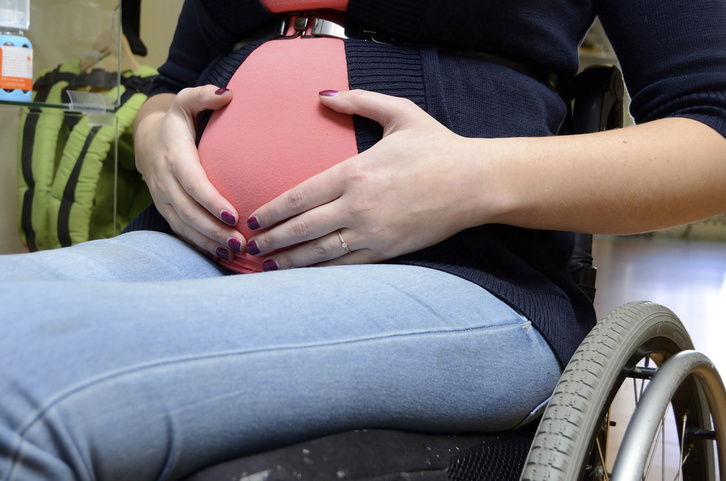Pregnancy among Women with Physical Disabilities: Unmet Needs and Recommendations on Navigating Pregnancy (Plain-language version)
Download PDF | Original version

Women with physical disabilities are just as likely to be pregnant as women without disabilities. There isn’t as much information for women with physical disabilities about navigating pregnancy, childbirth, and motherhood.
There are some problems that pregnant women with physical disabilities may have that other women don’t. Their medical team may not have enough information to help them with their pregnancy. They may not know about their disability. They can also mistreat pregnant women with physical disabilities just because they have a disability. Many doctors’ offices aren’t accessible for people with disabilities. Some research says that women with physical disabilities may have problems with their babies. Some babies may not weigh as much as they should. Some babies may be born ahead of time.
We wanted this study to show that women with physical disabilities have needs that need to be met so they can get better care overall. We found 25 women to talk to. We found these women through email lists, websites, and social media like Facebook. We interviewed the women for up to two hours. After we finished the interviews, we looked at what we wrote down to see what women said they needed.
Facts about the 25 participants
- Most participants were white and not Latina.
- The average age of the women at the time of their youngest child’s birth was 32.
- Fifteen women had pregnancies they planned for.
- Ten women had pregnancies they didn’t plan for.
- Eighteen women used some form of technology (assistive technology) to help them with their disability.
- Nearly half the women had children between the ages of five and ten.
- Seven women had children who also had disabilities.
Results
The interviews showed that there were three kinds of concerns that women with physical disabilities had during their pregnancies.
1. Medical staff’s knowledge and feelings about disability
Many women reported that their medical staff knew less about their disability than they would have liked. Some gave their patients wrong information. Some said bad things about people with disabilities. One doctor warned a woman who used a wheelchair that she would “automatically deliver at 26 weeks.” They also told her that her child “would be mentally and physically disabled.” The woman thought the doctor was saying bad things about her because she used a wheelchair. Another doctor asked a woman how she was able to be pregnant. They jokingly asked whether she used a turkey baster. One nurse refused to touch a woman’s leg to help push during labor. Part of that leg had been removed. Another nurse told a participant that “it was wonderful that somebody like (her) would still want to have a kid.”
Many women had bad experiences, but some had good ones, too. One said that her medical team treated her like a regular patient. Another one said that her medical staff told her that she was making a good decision.
2. Physical accessibility of doctors’ offices
Some women had problems using their doctors’ offices. Equipment like weight scales, bathrooms, and hospital beds were also hard to use. Several women said they were not weighed during their pregnancy. Some medical staff tried to guess people’s weight just by looking at them. Other women had their partners hold them so they could be weighed.
3. Information about help pregnant women with physical disabilities can get while they’re pregnant and after the birth
Some women did not get much information about how their disability affected their pregnancy. They also sometimes got more help from people who were not doctors. Some women could not get advice from other women who had gone through the same thing. It was hard for some of them to find doctors who knew about their disability. After their children were born, it was difficult for some women to find out about helpful tools. These tools included cribs, bassinets, and changing tables.
Recommendations for other women with physical disabilities
We asked the women in the study what advice they would give to other women with physical disabilities who are pregnant or considering becoming pregnant. They recommended women with physical disabilities:
-
Find a helpful doctor
Look for a doctor who is open-minded, supportive, respectful, and willing to learn about your specific disability as needed. If you feel a doctor is not right for you, find a different one. You deserve to be respected.
-
Get help from other mothers with disabilities
Find help not long after you find out you are pregnant. You can find this help in different places. This help can be online. You can also find help from groups that work with people with disabilities in your area or across the country.
-
Speak up
Don’t be afraid to tell your doctor what you want and need. It is important to speak up for yourself.
-
Prepare as much as they can
Do your own research about how your disability might affect pregnancy. It is best to do this before you become pregnant and meet with your doctor. For example, you can look up information about cribs that people in wheelchairs can use with their babies.
Download PDF | Original version
Adapted from Mitra, M. et al. (2016). Pregnancy among women with physical disabilities: Unmet needs and recommendations on navigating pregnancy. Disability and Health Journal. http://dx.doi.org/10.1016/j.dhjo.2015.12.007
